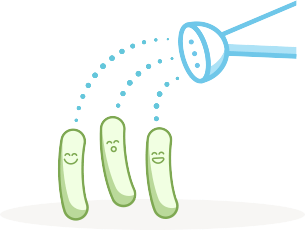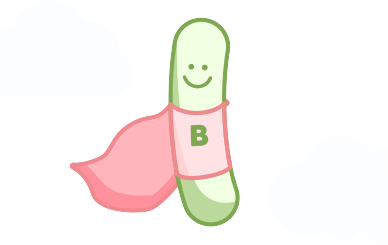Gluten Free Dietary Fiber Supplement | Benefiber

Prebiotic fiber helps nourish the growth of good bacteria that exist naturally in your gut by contributing to an environment that is optimal for good digestive health. Let’s dive in.

Keep Your Gut HappyWith Prebiotics
Your digestive system, or gut, is a marvelously intelligent and sensitive fuel system. It’s designed to break down foods and absorb their nutrients so that they can be converted into energy.1
Being the central nutritional hub gives your gut a star role in your total well-being.2 When in balance, your digestive system contributes to your health in several ways. To maintain this balance, it is important to keep “bad” bacteria from multiplying and overwhelming the gastrointestinal tract.3

Prebiotics Nourish the Good
Fiber with prebiotic effects (like the fiber in Benefiber) feeds and nourishes the good bacteria that exist naturally in your gut.
When you consume fiber, it’s fermented in the large intestine by the bacteria that live there. The fermentation produces byproducts (or food) and the environment that the bacteria need in order to proliferate.4

Prebiotics Feed Probiotics
Not only does prebiotic fiber strengthen and significantly increase the good bacteria, it helps suppress the bad bacteria, promoting an optimal environment for good digestive health.5
GUT CHECK
It’s recommended that you eat 21 to 38 grams of fiber per day.6*
You can get prebiotic fiber or take probiotics in many forms. The two are different.


Probiotics
Probiotics are live microorganisms that function like good bacteria in the gut.
Ingesting foods that contain them or taking probiotic supplements can help repopulate the beneficial bacteria, overwhelming the bad bacteria.
Probiotics are found in: yogurt, kefir, cottage cheese, cheddar cheese, sauerkraut, kombucha, pickled vegetables, kimchi, miso, and tempeh.




Prebiotics
Prebiotics are carbohydrates that act as food for beneficial bacteria in the gut.
These carbs travel undigested to the colon, where they ferment and produce small chain fatty acids that feed the gut flora.5 Not all plant foods function in this way, but those containing specific types of soluble fiber—including wheat dextrin—do.5
Prebiotics are found in: onions, garlic, leeks, soybeans, chicory root, honey, banana, Jerusalem artichoke, and Benefiber.



GUT CHECK
Bacteria outnumber the human cells in your body by about 10 to 1.3
And there are good guys and bad guys.


Good bacteria are awesome.
Your large intestine contains trillions of bacteria, and much of it is important for good digestive health.7 Bacteria helps you digest food, absorb nutrients, and boost immunity to viruses.8

Bad bacteria make you sick.
Sometimes, harmful bacteria proliferate out of control. This can cause gastrointestinal issues. Additionally, age, stress, poor diet, overall health, and environmental factors may play a role in disrupting the colonies of good bacteria, creating an imbalance in the gut flora.5
Probiotics help you stay balanced.
Probiotics are a type of good bacteria that can be consumed to improve the balance between good and bad bacteria in the large intestine.

Add prebiotics to nourish the good
Adding prebiotic fiber to your diet can help the good bacteria flourish, which in turn helps maintain balance in your digestive system.** Benefiber Original is a plant-based prebiotic fiber that’s clear and taste-free.
*According to the Institute of Medicine, it is recommended that, in adults 50 or younger, women should consume 25 grams of fiber daily and men 38 grams. In adults 51 or older, women should consume 21 grams of fiber daily and men 30 grams.
**These statements have not been evaluated by the Food and Drug Administration. This product is not intended to diagnose, treat, cure or prevent any disease.